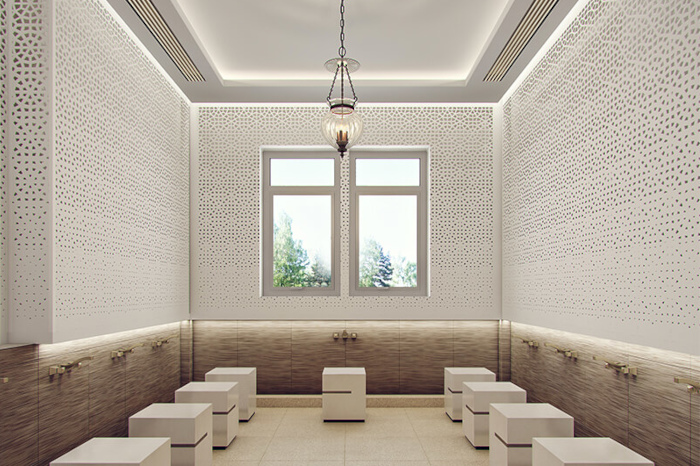1. Wudhu is a purification from minor sins.
عن عثمان بن عفان رضي الله عنه قال قال رسول الله صلى الله عليه وسلم من توضأ فأحسن الوضوء خرجت خطاياه من جسده حتى تخرج من تحت أظفاره (صحيح مسلم، الرقم: ٢٤٥)
Hazrat Uthmaan (radhiyallahu ‘anhu) reports that Hazrat Rasulullah (sallallahu ‘alaihi wasallam) said, “Whoever performs wudhu, and does it in a perfect manner, his (minor) sins are removed (and washed away) from his body to the extent that they fall off from beneath his nails.”
2. Wudhu will cause the limbs of wudhu to be illuminated with a special noor on the Day of Qiyaamah.
عن أبي هريرة رضي الله عنه أن رسول الله صلى الله عليه وسلم أتى المقبرة فقال السلام عليكم دار قوم مؤمنين وإنا إن شاء الله بكم لاحقون وددت أنا قد رأينا إخواننا قالوا أولسنا إخوانك يا رسول الله قال أنتم أصحابي وإخواننا الذين لم يأتوا بعد قالوا كيف تعرف من لم يأت بعد من أمتك يا رسول الله قال أرأيت لو أن رجلا له خيل غر محجلة بين ظهري خيل دهم بهم ألا يعرف خيله قالوا بلى يا رسول الله قال فإنهم يأتون غرا محجلين من الوضوء وأنا فرطهم على الحوض (صحيح مسلم، الرقم: ٢٤٩)
Hazrat Abu Hurairah (radhiyallahu ‘anhu) reports that Hazrat Rasulullah (sallallahu ‘alaihi wasallam) once entered the graveyard and recited the following dua:
اَلسَّلَامُ عَلَيْكُمْ دَارَ قَوْمٍ مُّؤْمِنِيْنَ وَإِنَّا إِنْ شَاءَ اللهُ بِكُمْ لَاحِقُوْنَ
“O (inmates of) the resting abode of the believers, may peace descend upon you from the side of Allah Ta‘ala, insha Allah we will soon be joining you.”
Hazrat Nabi (sallallahu ‘alaihi wasallam) then said, “I wish I had met our brothers.” The Sahaabah (sallallahu ‘alaihi wasallam) enquired, “Are we not your brothers, O Rasulullah (sallallahu ‘alaihi wasallam)?” Hazrat Nabi (sallallahu ‘alaihi wasallam) replied, “You are my companions (i.e. you have a greater position than the rest of the Ummah. You are my brothers and you are also blessed with my companionship). My brothers are those who have not yet come in the world (i.e. they will still be born and appear in the world after my demise).” The Sahaabah (radhiyallahu ‘anhum) further enquired, “O Rasulullah (sallallahu ‘alaihi wasallam), how will you recognize those of your followers who will come after you?” Hazrat Nabi (sallallahu ‘alaihi wasallam) replied, “If a person owns black horses with white foreheads and legs and they are mixed with horses that are completely black, will he not recognize his own horses from among them?” The Sahaabah (radhiyallahu ‘anhum) replied, “He will certainly recognize them, O Rasulullah (sallallahu ‘alaihi wasallam).” Hazrat Nabi (sallallahu ‘alaihi wasallam) replied, “They (my followers) will come on the Day of Qiyaamah with their foreheads and limbs illuminated with special noor on account of them performing wudhu for salaah (and it is through this sign that I will recognize them from others) and I will precede them (in reaching the Hereafter) and I will serve them water at the hawdh of Kawthar (when they will meet me on the Day of Qiyaamah).”
3. Remaining in the state of wudhu is a sign of a true believer.
عن ثوبان قال قال رسول الله صلى الله عليه وسلم استقيموا ولن تحصوا واعلموا أن خير أعمالكم الصلاة ولا يحافظ على الوضوء إلا مؤمن (سنن ابن ماجة، الرقم: ٢٧٧)[1]
Hazrat Thowbaan (radhiyallahu ‘anhu) reports that Hazrat Rasulullah (sallallahu ‘alaihi wasallam) said, “Try your best to adopt istiqaamah (steadfastness) in all matters, even though you will never manage to do so entirely, and remember that the most virtuous of deeds is salaah, and safeguarding the wudhu is a sign of a true believer (i.e. to perform a complete and perfect wudhu and to remain in the state of wudhu at all times is a sign of a true believer).”
4. The one who passes away in the state of wudhu is blessed with the rank of a martyr.
عن أنس بن مالك رضي الله عنه قال قال رسول الله صلى الله عليه وسلم يا بني إن استطعت أن لا تزال على وضوء فإنه من يأتيه الموت وهو على وضوء يعطى الشهادة (مجمع الزوائد، الرقم: ١٤٧٠)[2]
Hazrat Anas bin Maalik (radhiyallahu ‘anhu) reports that Hazrat Rasulullah (sallallahu ‘alaihi wasallam) said, “O my beloved son! If you are able to remain in the state of wudhu (then do so), as the one who passes away in the state of wudhu is blessed with the rank of a martyr.”
5. The one who performs a complete wudhu safeguards himself from Shaitaan, just as those who guard the Islamic frontiers safeguard the Muslims from the enemies of Islam.
عن أبي هريرة رضي الله عنه أن رسول الله صلى الله عليه وسلم قال ألا أدلكم على ما يمحو الله به الخطايا ويرفع به الدرجات قالوا بلى يا رسول الله قال إسباغ الوضوء على المكاره وكثرة الخطا إلى المساجد وانتظار الصلاة بعد الصلاة فذلكم الرباط (صحيح مسلم، الرقم: ٢٥١)
Hazrat Abu Hurairah (radhiyallahu ‘anhu) reports that Hazrat Rasulullah (sallallahu ‘alaihi wasallam) once asked the Sahaabah (radhiyallahu ‘anhum), “Should I not inform you of such actions through which Allah Ta‘ala will erase your sins and raise your ranks?” The Sahaabah (radhiyallahu ‘anhum) replied, “Certainly inform us, O Rasul of Allah (sallallahu ‘alaihi wasallam)!” Hazrat Rasulullah (sallallahu ‘alaihi wasallam) said, “Performing a complete wudhu despite difficulties, taking abundant steps in walking towards the masaajid and awaiting the next salaah after one salaah is performed. These actions resemble the action of those who protect the Islamic frontiers against the enemies of Islam (through these actions, one protects himself from the evils of nafs and Shaitaan, just as those guarding the frontiers protect the Muslims against the enemies of Islam).”
[1] قال البوصيري في الزوائد (1/102): رجال إسناده ثقات أثبات إلا أن فيه انقطاعا بين سالم وثوبان ولكن أخرجه الدارمي وابن حبان في صحيحه من طريق ثوبان متصلا
[2] قال الهيثمي: رواه أبو يعلى والطبراني في الصغير وزاد يا بني إذا خرجت من بيتك فلا يقعن بصرك على أحد من أهل القبلة إلا ظننت أنه له الفضل عليك يا بني إن ذلك من سنتي ومن أحيا سنتي فقد أحبني ومن أحبني كان معي في الجنة وفيه محمد بن الحسن بن أبي يزيد وهو ضعيف
قال البوصيري في الإتحاف (الرقم: 540): علي بن زيد بن جدعان ضعيف لكن لم ينفرد به علي بن زيد فقد رواه أحمد بن منيع ثنا يؤيد أبنا العلاء أبو محمد الثقفي سمعت أنس بن مالك … فذكره وسيأتي لفظه في آخر كتاب المواعظ إن شاء الله روى الترمذي قطعة منه في الصلاة وأخرى في العلم من طريق أعلي بن زيد
 Ihyaaud Deen An Effort to Revive Deen in Totality
Ihyaaud Deen An Effort to Revive Deen in Totality




